Unit 1 How can we become good learners.单元表格式学案(5课时)
文档属性
| 名称 | Unit 1 How can we become good learners.单元表格式学案(5课时) |
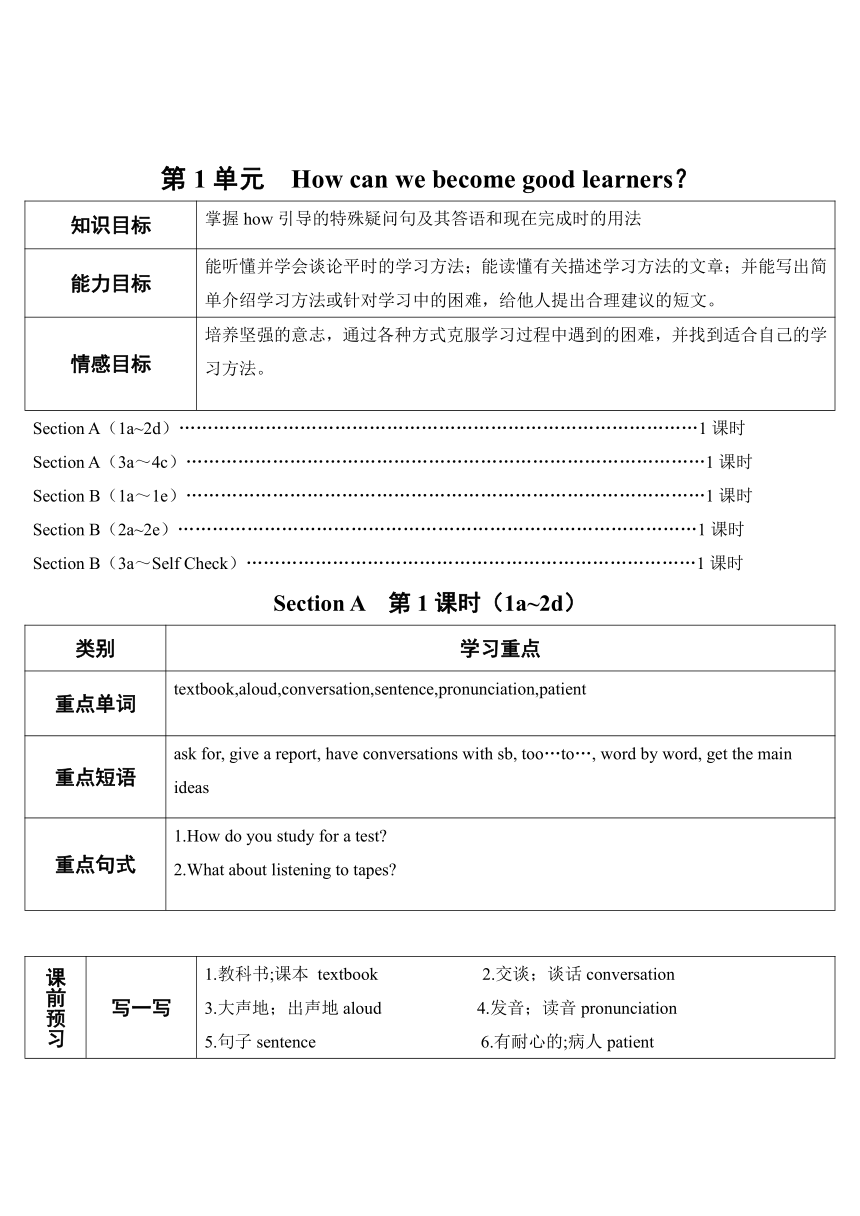
|
|
| 格式 | doc | ||
| 文件大小 | 185.5KB | ||
| 资源类型 | 教案 | ||
| 版本资源 | 人教新目标(Go for it)版 | ||
| 科目 | 英语 | ||
| 更新时间 | 2021-09-03 00:00:00 | ||
图片预览

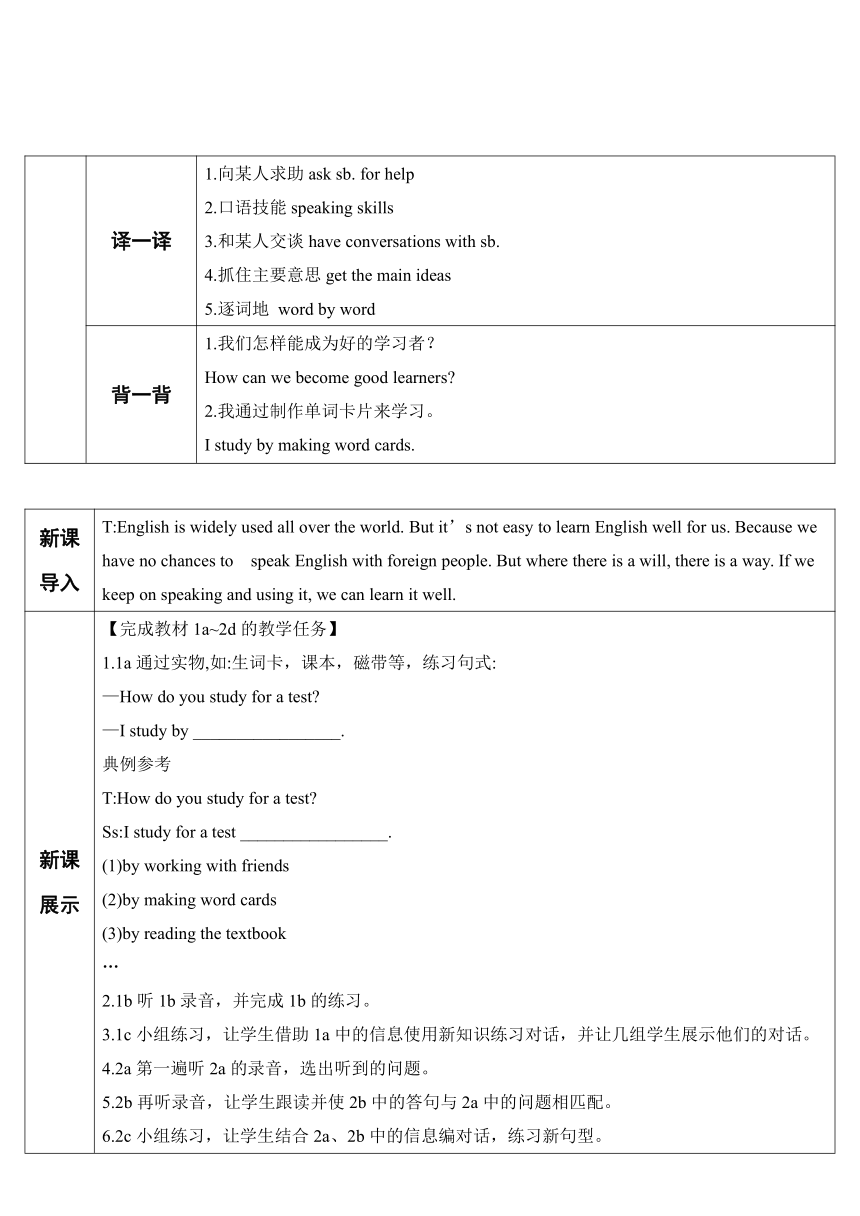
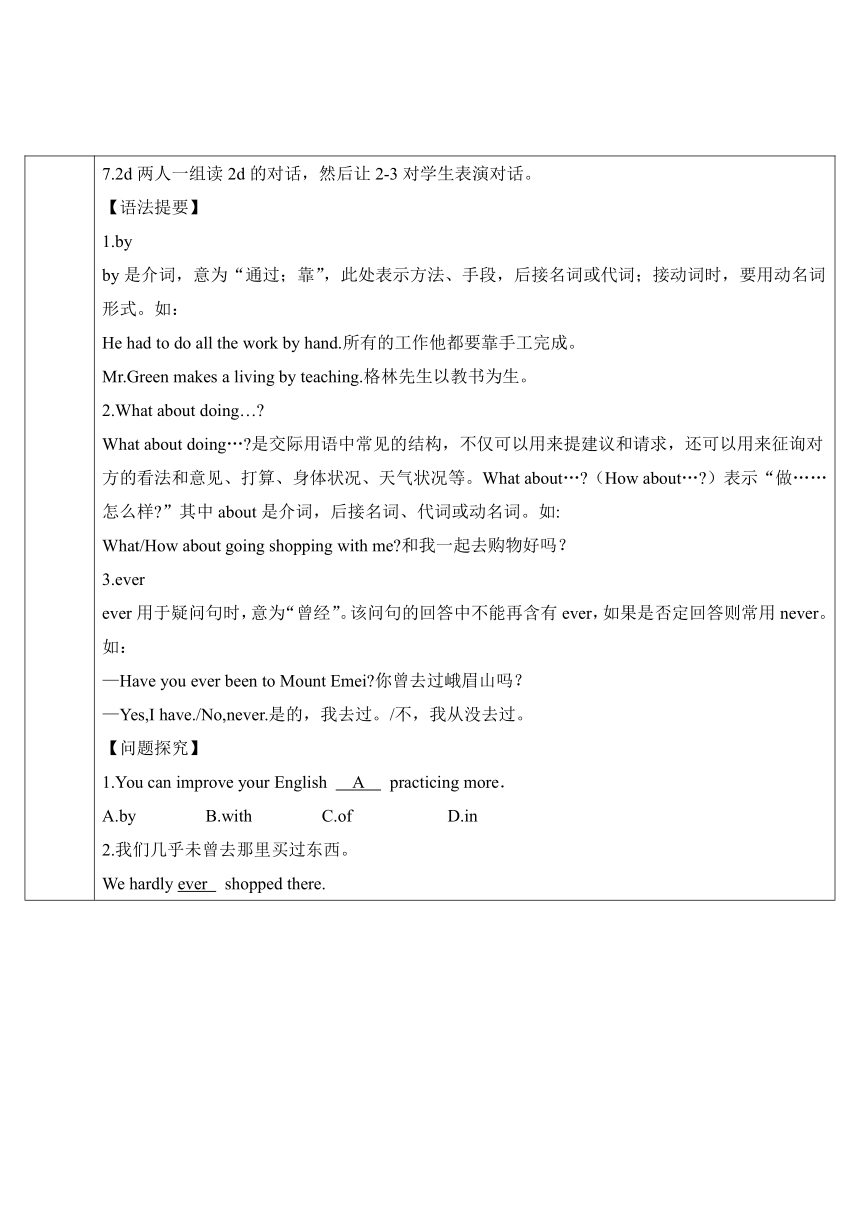
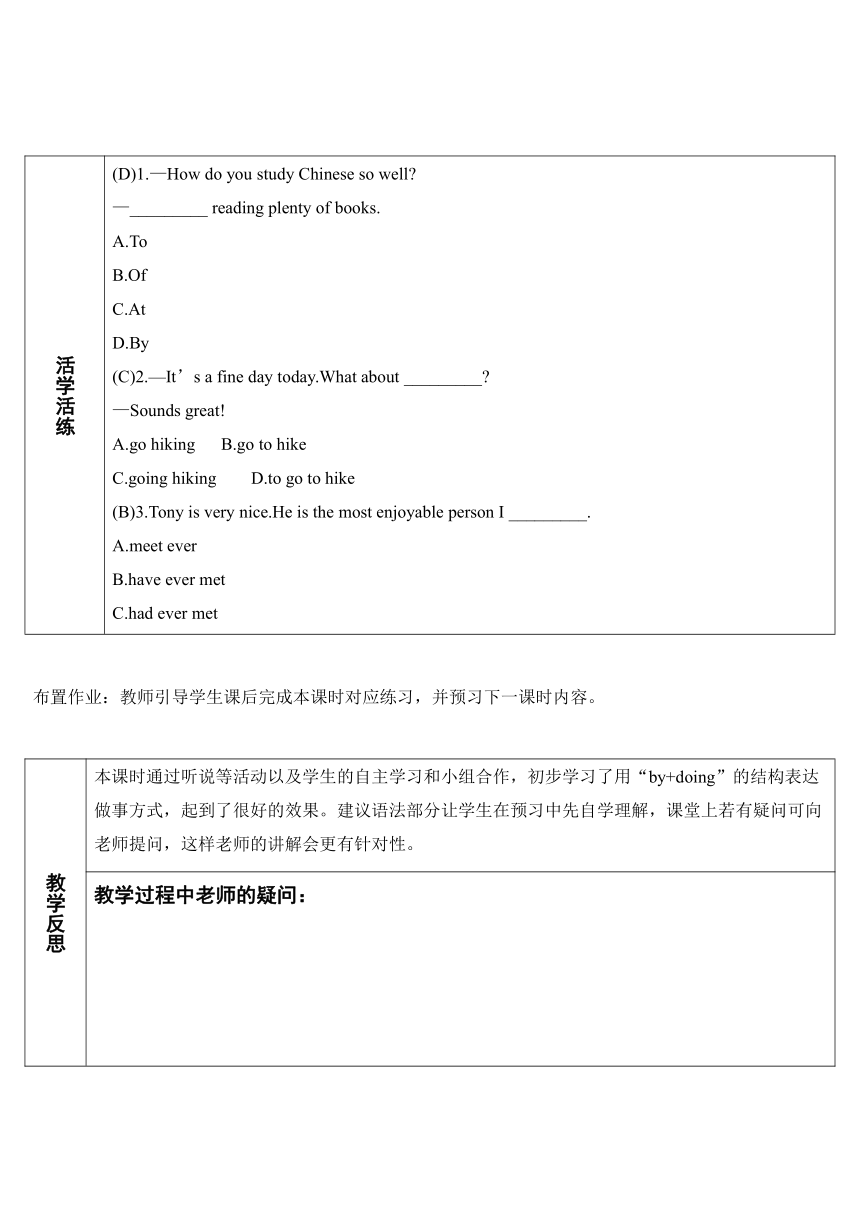
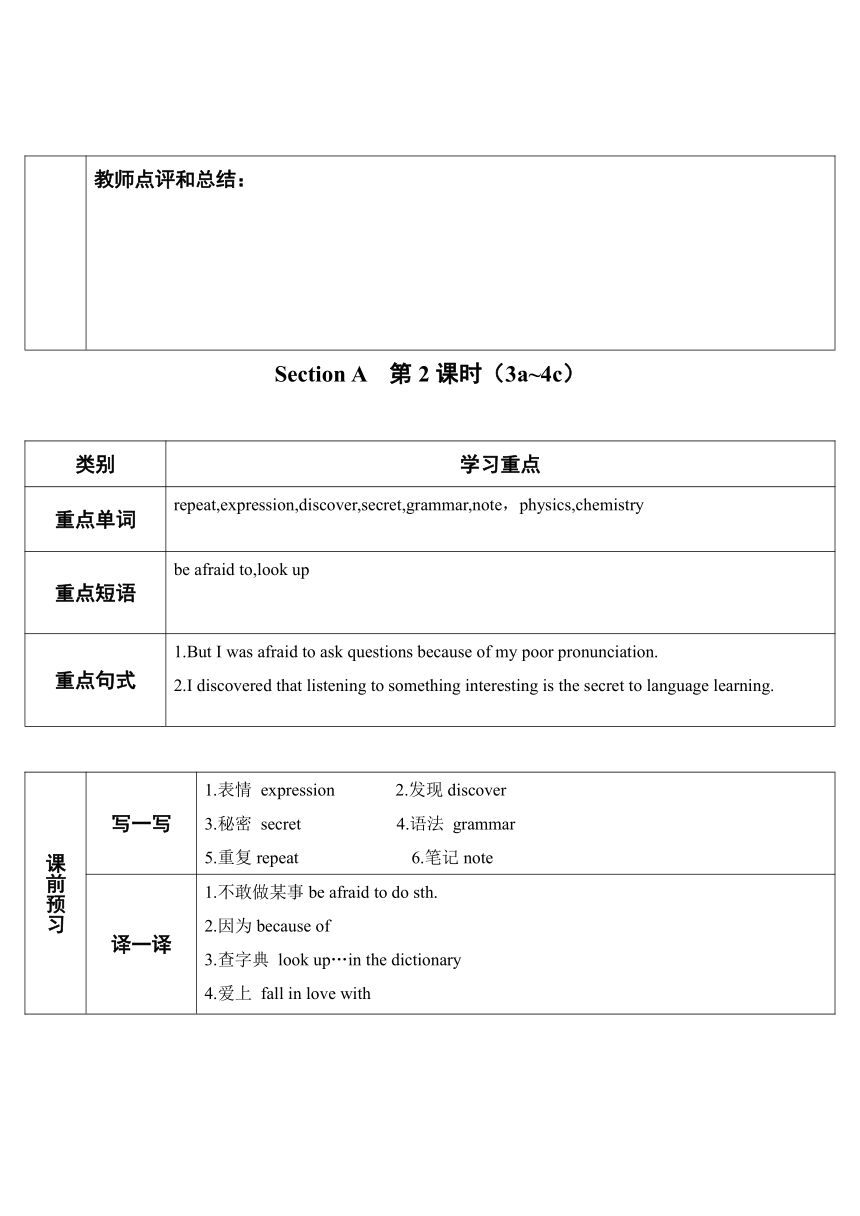
文档简介
第1单元
How
can
we
become
good
learners?
知识目标
掌握how引导的特殊疑问句及其答语和现在完成时的用法
能力目标
能听懂并学会谈论平时的学习方法;能读懂有关描述学习方法的文章;并能写出简单介绍学习方法或针对学习中的困难,给他人提出合理建议的短文。
情感目标
培养坚强的意志,通过各种方式克服学习过程中遇到的困难,并找到适合自己的学习方法。
Section
A(1a~2d)………………………………………………………………………………1课时
Section
A(3a~4c)………………………………………………………………………………1课时
Section
B(1a~1e)………………………………………………………………………………1课时
Section
B(2a~2e)………………………………………………………………………………1课时
Section
B(3a~Self
Check)……………………………………………………………………1课时
Section
A
第1课时(1a~2d)
类别
学习重点
重点单词
textbook,aloud,conversation,sentence,pronunciation,patient
重点短语
ask
for,
give
a
report,
have
conversations
with
sb,
too…to…,
word
by
word,
get
the
main
ideas
重点句式
1.How
do
you
study
for
a
test?2.What
about
listening
to
tapes?
课前预习
写一写
1.教科书;课本
textbook
2.交谈;谈话conversation3.大声地;出声地aloud
4.发音;读音pronunciation5.句子sentence
6.有耐心的;病人patient
译一译
1.向某人求助ask
sb.
for
help2.口语技能speaking
skills3.和某人交谈have
conversations
with
sb.4.抓住主要意思get
the
main
ideas5.逐词地
word
by
word
背一背
1.我们怎样能成为好的学习者?How
can
we
become
good
learners?2.我通过制作单词卡片来学习。I
study
by
making
word
cards.
新课导入
T:English
is
widely
used
all
over
the
world.
But
it’s
not
easy
to
learn
English
well
for
us.
Because
we
have
no
chances
to
speak
English
with
foreign
people.
But
where
there
is
a
will,
there
is
a
way.
If
we
keep
on
speaking
and
using
it,
we
can
learn
it
well.
新课展示
【完成教材1a~2d的教学任务】1.1a通过实物,如:生词卡,课本,磁带等,练习句式:—How
do
you
study
for
a
test?—I
study
by
_________________.典例参考T:How
do
you
study
for
a
test?Ss:I
study
for
a
test
_________________.(1)by
working
with
friends(2)by
making
word
cards(3)by
reading
the
textbook…2.1b听1b录音,并完成1b的练习。3.1c小组练习,让学生借助1a中的信息使用新知识练习对话,并让几组学生展示他们的对话。4.2a第一遍听2a的录音,选出听到的问题。5.2b再听录音,让学生跟读并使2b中的答句与2a中的问题相匹配。6.2c小组练习,让学生结合2a、2b中的信息编对话,练习新句型。7.2d两人一组读2d的对话,然后让2-3对学生表演对话。【语法提要】1.byby是介词,意为“通过;靠”,此处表示方法、手段,后接名词或代词;接动词时,要用动名词形式。如:He
had
to
do
all
the
work
by
hand.所有的工作他都要靠手工完成。Mr.Green
makes
a
living
by
teaching.格林先生以教书为生。2.What
about
doing…?What
about
doing…?是交际用语中常见的结构,不仅可以用来提建议和请求,还可以用来征询对方的看法和意见、打算、身体状况、天气状况等。What
about…?(How
about…?)表示“做……怎么样?”其中about是介词,后接名词、代词或动名词。如:What/How
about
going
shopping
with
me?和我一起去购物好吗?3.everever用于疑问句时,意为“曾经”。该问句的回答中不能再含有ever,如果是否定回答则常用never。如:—Have
you
ever
been
to
Mount
Emei?你曾去过峨眉山吗?—Yes,I
have./No,never.是的,我去过。/不,我从没去过。【问题探究】1.You
can
improve
your
English
A
practicing
more.A.by
B.with
C.of
D.in2.我们几乎未曾去那里买过东西。We
hardly
ever
shopped
there.
活学活练
(D)1.—How
do
you
study
Chinese
so
well?—_________
reading
plenty
of
books.A.ToB.OfC.AtD.By(C)2.—It’s
a
fine
day
today.What
about
_________?—Sounds
great!A.go
hiking
B.go
to
hikeC.going
hiking
D.to
go
to
hike(B)3.Tony
is
very
nice.He
is
the
most
enjoyable
person
I
_________.A.meet
everB.have
ever
metC.had
ever
met
布置作业:教师引导学生课后完成本课时对应练习,并预习下一课时内容。
教学反思
本课时通过听说等活动以及学生的自主学习和小组合作,初步学习了用“by+doing”的结构表达做事方式,起到了很好的效果。建议语法部分让学生在预习中先自学理解,课堂上若有疑问可向老师提问,这样老师的讲解会更有针对性。
教学过程中老师的疑问:
教师点评和总结:
Section
A
第2课时(3a~4c)
类别
学习重点
重点单词
repeat,expression,discover,secret,grammar,note,physics,chemistry
重点短语
be
afraid
to,look
up
重点句式
1.But
I
was
afraid
to
ask
questions
because
of
my
poor
pronunciation.2.I
discovered
that
listening
to
something
interesting
is
the
secret
to
language
learning.
课前预习
写一写
1.表情
expression
2.发现discover3.秘密
secret
4.语法
grammar5.重复repeat
6.笔记note
译一译
1.不敢做某事be
afraid
to
do
sth.2.因为because
of3.查字典
look
up…in
the
dictionary4.爱上
fall
in
love
with
背一背
1.老师说那么快,以至于我大多数时间听不懂。The
teacher
spoke
so
quickly
that
I
didn\'t
understand
her
most
of
the
time.2.因为我发音差,所以我不敢问问题。I
was
afraid
to
ask
questions
because
of
my
poor
pronunciation.3.我也意识到我能仅通过听关键词来听懂意思。I
also
realized
I
could
get
the
meaning
by
listening
for
just
the
key
words.
新课导入
T:How
do
you
learn
English?Ss:I
learn
by
listening
to
tapes/studying
with
a
group/…
新课展示
【完成教材3a~4c的教学任务】1.3a通过阅读文章回答问题。2.3b再次阅读文章,用新单词或短语将句子补充完整。3.4a为4a中的问句选择合适的答语,并用其练习对话。4.4b用4b中所给出的单词及“do
sth.by
doing”的结构造句。5.4c在你学习英语的做法上打“√”。然后采访你的同伴。【语法提要】1.afraidafraid作形容词,意为“害怕的;
担心的”。常构成:be
afraid
to
do
sth.意为“害怕去做某事”。如:I\'m
afraid
to
travel
by
plane.我害怕乘飞机旅行。Are
you
afraid
to
stay
at
home
alone?你害怕一个人待在家里吗?拓展:(1)be
afraid
of
doing
sth.害怕做某事。如:I\'m
afraid
of
going
out
alone
at
night.我害怕夜晚独自外出。(2)be
afraid
of
sb./sth.害怕某人/某物。如:Are
you
afraid
of
snakes?你怕蛇吗?2.expressionexpression作可数名词,意为“表情;表示;表达”,复数形式为expressions。如:He
always
shows
a
happy
expression.他总是露出快乐的表情。3.discoverdiscover作动词,意为“发现;碰见;撞见;获得知识”。如:She
discovered
that
they\'d
escaped.她发现他们已经逃跑了。The
scientists
are
trying
to
discover
a
cure
for
AIDS.科学家们在努力寻找治疗艾滋病的方法。辨析:invent
与discover(1)discover指“发现”某种本来存在,而以前未被发现的事物或未为人所知的东西。如:I
discovered
(that)
she
was
a
good
cook.我发现她是个烹饪好手/她很会烧菜。(2)invent指“发明”,即原来没有而后来发明创造的东西。如:Edison
didn\'t
discover
electricity,but
invented
the
light
bulb.爱迪生不是发现了电,而是发明了灯泡。【问题探究】1.—Are
you
B
the
dark?—Oh,yes.I
always
go
to
sleep
with
the
light
on.A.used
to
B.afraid
ofC.interested
in
D.good
with2.The
expression
on
her
face
shows
that
she
is
angry
now.3.Electric
light
was
invented
(invent)
by
Thomas
Edison
and
America
was
discovered
(discover)
by
Columbus.4.—
B
do
you
go
home
every
day?—By
bike.It\'s
not
far
from
here.A.What
B.How
C.When
D.Where
活学活练
(A)1.She
that
she
might
lose
her
job.A.was
afraid
B.is
afraid
ofC.afraid
D.were
afraid
(C)2.(浙江舟山中考)You\'d
better
read
the
first
before
you
use
the
camera.A.websites
B.expressionsC.instructions
D.advertisements(A)3.It
was
a
shock
to
the
truth
about
his
sordid(丑恶的)
past.A.discover
B.invent
C.find
布置作业:教师引导学生课后完成本课时对应练习,并预习下一课时内容。
教学反思
本课时通过说的活动以及学生的自主学习和小组合作,用知识目标中的句型对各种学习方法进行了探讨,并且能够运用重点句子根据提示讨论如何学习英语,同时学生们还根据Grammar
Focus总结了Section
A的重点句型,起到了很好的效果。
教学过程中老师的疑问:
教师点评和总结:
Section
B
第3课时(1a~1e)
类别
学习重点
重点单词
pronounce,
partner,
increase,
speed
重点短语
spoken
English,
make
mistakes
重点句式
1.I
can’t
always
understand
spoken
English.2.I
often
make
mistakes
in
grammar.3.I
don’t
have
a
partner
to
practice
English
with.
课前预习
写一写
1.发音pronounce
2.增加;增长increase3.速度speed
4.搭档;同伴partner
译一译
1.口语
spoken
English2.在语法上犯错误make
mistakes
in
grammar3.写作练习writing
practice4.练习说英语practice
speaking
English
背一背
1.我不知道怎样提高我的阅读速度。I
don’t
know
how
to
increase
my
reading
speed.2.我没有一个搭档和我练习英语。I
don’t
have
a
partner
to
practice
English
with.
新课导入
T:Learning
English
can
be
difficult.
What
things
are
difficult
for
you?Ss:
I
can’t
spell
some
English
words./I
can’t
pronounce
some
of
the
words./…
新课展示
【完成教材1a~1e的教学任务】1.1a阅读1a中的清单,让学生在符合自己情况的陈述前打“√”,并朗读这些句子。2.1b参照1a中的句子,让学生制作一个清单,列举自己觉得困难的事情。3.1c听1c录音,并完成1c的练习。4.1d再听录音,让学生完成1d的练习。5.1e让学生用1c和1d中的信息分角色表演对话。【语法提要】1.spokenspoken是形容词,意为“口语的;口头的”,常在句中作定语。如:Our
English
teacher
asked
us
to
pay
attention
to
spoken
English.我们的英语老师要我们注意英语口语。2.mistakemistake用作可数名词,意为“错误”。make
mistakes是动词短语,意为“犯错;出错”,还可以说make
a
mistake。“在某方面犯错误”用make
mistakes
in…。如:Did
you
make
a
mistake
again?你又犯错误了吗?I
used
to
make
mistakes
in
spelling.我过去常常犯拼写错误。【问题探究】1.Reading
aloud
is
good
for
your
spoken
(speak)
English.2.He’s
poor
in
spelling.
He
made
a
lot
of
spelling
mistakes
in
his
writing.
活学活练
(A)1.Her
_________
English
is
very
good!A.
spoken
B.
speakingC.
speak
D.
spoke(B)2.I
_____
a
mistake.
Please
don’t
be
angry
with
me.A.
make
B.
madeC.
will
make
D.
had
made
教师引导学生课后完成本课时对应练习,并预习下一课时内容。
教学反思
本课时通过听和说的活动继续进一步学习陈述自己在学习中遇到的困难。通过这一课时的学习,学生们已经基本掌握了本课时的重点词汇,能用“Maybe
you
should…”,“Why
don’t
you…?”等句式为他人提出建议。
教学过程中老师的疑问:
教师点评和总结:
Section
B
第4课时(2a~2e)
类别
学习重点
重点单词
born,
ability,
review,
create,
brain,
active,
knowledge,attention,
connect,
wisely
重点短语
pay
attention
to,
connect…with…,depend
on,
in
common,
be
good
at,
be
interested
in,
agree
with
重点句式
1.Studies
show
that
if
you
are
interested
in
something,
your
brain
is
more
active
and
it
is
also
easier
for
you
to
pay
attention
to
it
for
a
long
time.2.Good
learners
often
connect
what
they
need
to
learn
with
something
interesting.
课前预习
写一写
1.天生的born
2.能力ability3.创造
create
4.活跃的
active5.(使)连接
connect
6.知识
knowledge
译一译
1.注意;关注
pay
attention
to2.把……和……连接/联系起来connect…with…3.对……产生兴趣
create
an
interest
in4.依赖
depend
on5.普通地;共同地
in
common6.出生
be
born
背一背
1.即使你学得好,你也会忘记的,除非你用它。Even
if
you
learn
something
well,
you
will
forget
it
unless
you
use
it.2.他的成功源于多次尝试以及从错误中学习。He
succeeded
by
trying
many
times
and
learning
from
his
mistakes.3.他们也在寻找复习已学知识的方法。They
also
look
for
ways
to
review
what
they
have
learned.
新课导入
T:What
good
learning
habits
can
you
think
of?Ss:
新课展示
【完成教材2a~2e的教学任务】1.2a让学生按2a的要求,列一个表,把他(她)们认为好的学习习惯写在上面。2.2b根据2b的要求阅读文章,找出四个习惯。3.2c让学生再次阅读文章并且回答2c中的问题。4.2d要求在字典中查出2d中单词的意思,然后造句。5.2e让学生进行小组讨论:你认为你是个好学生吗?你觉得什么学习习惯是有用的?【语法提要】1.ability(1)表示“能力”,多为不可数名词;表示“才能;才干”时,多用复数形式。如:He
is
a
man
of
ability.他是一位有能力的人。(2)表示“有能力做某事”或“具有做某事的能力”,其后通常要接不定式。如:The
ability
to
be
clearly
heard
is
extremely
important
for
newsreaders.声音宏亮清晰对新闻广播员来说极为重要。2.depend
ondepend
on意为“依赖;依靠;取决于;随……而定”。如:Children
depend
on
their
parents
for
food
and
clothing.小孩依赖他们的父母供给衣食。It
all
depends
on
whether
she
likes
the
dress
or
not.一切都取决于她喜欢还是不喜欢这件裙子。3.commoncommon作形容词,意为“普通的,通俗的;公共的,共有的”。如:Structural
reform
was
less
common.体制改革并不普遍。in
common意为“共同的;共有的”。如:I
have
nothing
in
common
with
Jane.我和简毫无共同之处。拓展:in
common
with
sb./sth.有两个意思:(1)与某人/某事物一起。如:In
common
with
many
others,
she
applied
for
a
training
place.她已和许多人一起申请参加训练。(2)像某人/某事物一样。如:You
are
in
common
with
me.你和我志趣相投。4.pay
attention
topay
attention
to意为“注意;留意”。如:You
must
pay
attention
to
your
teacher
in
the
class.你上课的时候必须专心听老师讲课。I
hope
you
will
pay
attention
to
this
problem.希望你对这个问题给予关注。5.connectconnect
作动词,意为“连接;联合;关联”。如:I
cannot
connect
the
two
things
in
my
mind.在我心中,我无法将这两件事情联系在一起。connect
with意为“和……有关;和……有联系”,也可以这样用:connect
sth./sb.
with
sb./sth.。如:He
is
connected
with
the
murder.那件谋杀案和他有关。6.be
good
atbe
good
at意为“擅长”。如:A
good
listener
must
be
good
at
asking
questions.一个好的聆听者应该善于问问题。I
am
good
at
English.我擅长英语。【问题探究】1.(山东青岛中考)The
3rd
China's
Got
Talent(《中国达人秀》)gives
child
a
chance
to
show
his
special
A.A.
ability
B.
behavior
C.
education
D.
background2.从方框中选出合适的词并用其正确形式填空。in
common,
pay
attention
to,
be
good
at(1)Like
most
people,
he
enjoys
dancing,
and
that's
the
one
thing
he
has
in
common
with
them.(2)Please
pay
attention
to
taking
care
of
your
baby.(3)A
good
listener
must
be
good
at
asking
questions.
活学活练
(A)1.(天津中考)In
1998,Liu
Xiang's___________
in
hurdling
was
noticed
by
Sun
Haiping.A.
ability
B.
trade
C.
electricity
D.
memory(C)2.(浙江湖州中考)—Shall
we
go
for
a
picnic
tomorrow?—Well,
it
all__________
the
weather.A.
belongs
to
B.
happens
toC.
depends
on
D.
concentrate
on(C)3.We
are
brothers,
but
we
have
__________.A.
everything
in
commonB.
something
in
commonC.
nothing
in
common(C)4.(广西贵港中考)The
math
teacher
got
angry
with
me
when
I
did
not_____
him
in
class
yesterday.A.
look
for
B.
take
careC.
pay
attention
to
D.
fall
asleep(A)5.She
was______
the
girl
who
used
to
live
next
door
to
me.A.
connected
with
B.
connectedC.
connect
with
D.
connect
to
(A)6.He
is
good
_______
playing
table
tennis.A.at
B.
with
C.
for
D.to
布置作业:教师引导学生课后完成本课时对应练习,并预习下一课时内容。
教学反思
本课时是一节阅读课,通过引导学生阅读文段,完成阅读理解题,一方面学会在阅读中抓关键句,带着问题有目的地阅读,另一方面学会运用词典解决阅读中的生词。学生基本上能够熟练地朗读课文,起到了很好的效果。
教学过程中老师的疑问:
教师点评和总结:
Section
B
第5课时(3a~Self
Check)
类别
学习重点
重点短语
take
notes,
worry
about
重点句式
1.There
are
three
good
ways
to…2.You
could
try
to
improve
your
English
by…
译一译
1.记笔记
take
notes2.担心
worry
about
背一背
1.如果你喜欢音乐,你可以通过听英语歌曲来学英语。If
you
like
music,
you
can
learn
English
by
listening
to
English
songs.2.尽力学习并且一点一点地记住信息,而不是等到最后一分钟才马上去学习一切。Try
to
study
and
remember
information
bit
by
bit
instead
of
waiting
until
the
last
minute
to
study
everything
at
once.3.我通过反复地听(录音)磁带来提高我的听力,直到我能全部听懂。I
practice
my
listening
by
listening
to
the
tape
over
and
over
again
until
I
can
understand
everything.
新课导入
T:Do
you
know
what
are
the
best
ways
to
learn?Ss:
Yes.T:For
example?Ss:
If
you
like
music,
you
can
learn
English
by
listening
to
English
songs…
新课展示
【完成教材3a~Self
Check的教学任务】1.3a学生根据3a的要求完成图表。2.3b使用3a中的笔记,根据3b的表达,给你的朋友写一封信。3.Self
Check
1按要求完成Self-Check中的第一题,用方框中的单词填空。4.Self
Check
2按要求给句子编号,使其成为完整的对话。5.Self
Check
3根据要求给出恰当的建议。【语法提要】1.be
interested
inbe
interested
in后接名词、代词或动名词,意为“对……感兴趣”。如:Tom
is
interested
in
exploring
the
mysterious
nature.汤姆对探索神秘的大自然感兴趣。2.if在含有if引导的条件状语从句的复合句中,若主句用一般将来时,则从句用一般现在时表示将来。主句也可用祈使句或含有情态动词的句子。如:If
it
rains
tomorrow,
I’ll
stay
at
home.如果明天下雨,我将待在家里。【问题探究】1.The
boy
is
interested(interest)
in
playing
sports.2.如果是我的错,我会向她说对不起。If
it
is
my
fault,
I
will
say
sorry
to
her.
活学活练
(D)1.The
ants
are
interested
_________
sugar.A.at
B.
on
C.
for
D.in
(A)2.If
he
______
,I
will
talk
about
the
matter
with
him.A.
comes
B.
will
come
C.
coming
D.
came
布置作业:教师引导学生课后完成本课时对应练习,并预习下一课时内容。
教学反思
本课时是一节单元小结课,在上本节课之前,一定要让学生掌握本单元的重点单词、短语、句子,然后在课堂上,教师要引导学生梳理知识点,通过完成Self
Check中的活动任务,让学生对本单元要掌握的知识有一个清晰的思路。
教学过程中老师的疑问:
教师点评和总结:
PAGE
How
can
we
become
good
learners?
知识目标
掌握how引导的特殊疑问句及其答语和现在完成时的用法
能力目标
能听懂并学会谈论平时的学习方法;能读懂有关描述学习方法的文章;并能写出简单介绍学习方法或针对学习中的困难,给他人提出合理建议的短文。
情感目标
培养坚强的意志,通过各种方式克服学习过程中遇到的困难,并找到适合自己的学习方法。
Section
A(1a~2d)………………………………………………………………………………1课时
Section
A(3a~4c)………………………………………………………………………………1课时
Section
B(1a~1e)………………………………………………………………………………1课时
Section
B(2a~2e)………………………………………………………………………………1课时
Section
B(3a~Self
Check)……………………………………………………………………1课时
Section
A
第1课时(1a~2d)
类别
学习重点
重点单词
textbook,aloud,conversation,sentence,pronunciation,patient
重点短语
ask
for,
give
a
report,
have
conversations
with
sb,
too…to…,
word
by
word,
get
the
main
ideas
重点句式
1.How
do
you
study
for
a
test?2.What
about
listening
to
tapes?
课前预习
写一写
1.教科书;课本
textbook
2.交谈;谈话conversation3.大声地;出声地aloud
4.发音;读音pronunciation5.句子sentence
6.有耐心的;病人patient
译一译
1.向某人求助ask
sb.
for
help2.口语技能speaking
skills3.和某人交谈have
conversations
with
sb.4.抓住主要意思get
the
main
ideas5.逐词地
word
by
word
背一背
1.我们怎样能成为好的学习者?How
can
we
become
good
learners?2.我通过制作单词卡片来学习。I
study
by
making
word
cards.
新课导入
T:English
is
widely
used
all
over
the
world.
But
it’s
not
easy
to
learn
English
well
for
us.
Because
we
have
no
chances
to
speak
English
with
foreign
people.
But
where
there
is
a
will,
there
is
a
way.
If
we
keep
on
speaking
and
using
it,
we
can
learn
it
well.
新课展示
【完成教材1a~2d的教学任务】1.1a通过实物,如:生词卡,课本,磁带等,练习句式:—How
do
you
study
for
a
test?—I
study
by
_________________.典例参考T:How
do
you
study
for
a
test?Ss:I
study
for
a
test
_________________.(1)by
working
with
friends(2)by
making
word
cards(3)by
reading
the
textbook…2.1b听1b录音,并完成1b的练习。3.1c小组练习,让学生借助1a中的信息使用新知识练习对话,并让几组学生展示他们的对话。4.2a第一遍听2a的录音,选出听到的问题。5.2b再听录音,让学生跟读并使2b中的答句与2a中的问题相匹配。6.2c小组练习,让学生结合2a、2b中的信息编对话,练习新句型。7.2d两人一组读2d的对话,然后让2-3对学生表演对话。【语法提要】1.byby是介词,意为“通过;靠”,此处表示方法、手段,后接名词或代词;接动词时,要用动名词形式。如:He
had
to
do
all
the
work
by
hand.所有的工作他都要靠手工完成。Mr.Green
makes
a
living
by
teaching.格林先生以教书为生。2.What
about
doing…?What
about
doing…?是交际用语中常见的结构,不仅可以用来提建议和请求,还可以用来征询对方的看法和意见、打算、身体状况、天气状况等。What
about…?(How
about…?)表示“做……怎么样?”其中about是介词,后接名词、代词或动名词。如:What/How
about
going
shopping
with
me?和我一起去购物好吗?3.everever用于疑问句时,意为“曾经”。该问句的回答中不能再含有ever,如果是否定回答则常用never。如:—Have
you
ever
been
to
Mount
Emei?你曾去过峨眉山吗?—Yes,I
have./No,never.是的,我去过。/不,我从没去过。【问题探究】1.You
can
improve
your
English
A
practicing
more.A.by
B.with
C.of
D.in2.我们几乎未曾去那里买过东西。We
hardly
ever
shopped
there.
活学活练
(D)1.—How
do
you
study
Chinese
so
well?—_________
reading
plenty
of
books.A.ToB.OfC.AtD.By(C)2.—It’s
a
fine
day
today.What
about
_________?—Sounds
great!A.go
hiking
B.go
to
hikeC.going
hiking
D.to
go
to
hike(B)3.Tony
is
very
nice.He
is
the
most
enjoyable
person
I
_________.A.meet
everB.have
ever
metC.had
ever
met
布置作业:教师引导学生课后完成本课时对应练习,并预习下一课时内容。
教学反思
本课时通过听说等活动以及学生的自主学习和小组合作,初步学习了用“by+doing”的结构表达做事方式,起到了很好的效果。建议语法部分让学生在预习中先自学理解,课堂上若有疑问可向老师提问,这样老师的讲解会更有针对性。
教学过程中老师的疑问:
教师点评和总结:
Section
A
第2课时(3a~4c)
类别
学习重点
重点单词
repeat,expression,discover,secret,grammar,note,physics,chemistry
重点短语
be
afraid
to,look
up
重点句式
1.But
I
was
afraid
to
ask
questions
because
of
my
poor
pronunciation.2.I
discovered
that
listening
to
something
interesting
is
the
secret
to
language
learning.
课前预习
写一写
1.表情
expression
2.发现discover3.秘密
secret
4.语法
grammar5.重复repeat
6.笔记note
译一译
1.不敢做某事be
afraid
to
do
sth.2.因为because
of3.查字典
look
up…in
the
dictionary4.爱上
fall
in
love
with
背一背
1.老师说那么快,以至于我大多数时间听不懂。The
teacher
spoke
so
quickly
that
I
didn\'t
understand
her
most
of
the
time.2.因为我发音差,所以我不敢问问题。I
was
afraid
to
ask
questions
because
of
my
poor
pronunciation.3.我也意识到我能仅通过听关键词来听懂意思。I
also
realized
I
could
get
the
meaning
by
listening
for
just
the
key
words.
新课导入
T:How
do
you
learn
English?Ss:I
learn
by
listening
to
tapes/studying
with
a
group/…
新课展示
【完成教材3a~4c的教学任务】1.3a通过阅读文章回答问题。2.3b再次阅读文章,用新单词或短语将句子补充完整。3.4a为4a中的问句选择合适的答语,并用其练习对话。4.4b用4b中所给出的单词及“do
sth.by
doing”的结构造句。5.4c在你学习英语的做法上打“√”。然后采访你的同伴。【语法提要】1.afraidafraid作形容词,意为“害怕的;
担心的”。常构成:be
afraid
to
do
sth.意为“害怕去做某事”。如:I\'m
afraid
to
travel
by
plane.我害怕乘飞机旅行。Are
you
afraid
to
stay
at
home
alone?你害怕一个人待在家里吗?拓展:(1)be
afraid
of
doing
sth.害怕做某事。如:I\'m
afraid
of
going
out
alone
at
night.我害怕夜晚独自外出。(2)be
afraid
of
sb./sth.害怕某人/某物。如:Are
you
afraid
of
snakes?你怕蛇吗?2.expressionexpression作可数名词,意为“表情;表示;表达”,复数形式为expressions。如:He
always
shows
a
happy
expression.他总是露出快乐的表情。3.discoverdiscover作动词,意为“发现;碰见;撞见;获得知识”。如:She
discovered
that
they\'d
escaped.她发现他们已经逃跑了。The
scientists
are
trying
to
discover
a
cure
for
AIDS.科学家们在努力寻找治疗艾滋病的方法。辨析:invent
与discover(1)discover指“发现”某种本来存在,而以前未被发现的事物或未为人所知的东西。如:I
discovered
(that)
she
was
a
good
cook.我发现她是个烹饪好手/她很会烧菜。(2)invent指“发明”,即原来没有而后来发明创造的东西。如:Edison
didn\'t
discover
electricity,but
invented
the
light
bulb.爱迪生不是发现了电,而是发明了灯泡。【问题探究】1.—Are
you
B
the
dark?—Oh,yes.I
always
go
to
sleep
with
the
light
on.A.used
to
B.afraid
ofC.interested
in
D.good
with2.The
expression
on
her
face
shows
that
she
is
angry
now.3.Electric
light
was
invented
(invent)
by
Thomas
Edison
and
America
was
discovered
(discover)
by
Columbus.4.—
B
do
you
go
home
every
day?—By
bike.It\'s
not
far
from
here.A.What
B.How
C.When
D.Where
活学活练
(A)1.She
that
she
might
lose
her
job.A.was
afraid
B.is
afraid
ofC.afraid
D.were
afraid
(C)2.(浙江舟山中考)You\'d
better
read
the
first
before
you
use
the
camera.A.websites
B.expressionsC.instructions
D.advertisements(A)3.It
was
a
shock
to
the
truth
about
his
sordid(丑恶的)
past.A.discover
B.invent
C.find
布置作业:教师引导学生课后完成本课时对应练习,并预习下一课时内容。
教学反思
本课时通过说的活动以及学生的自主学习和小组合作,用知识目标中的句型对各种学习方法进行了探讨,并且能够运用重点句子根据提示讨论如何学习英语,同时学生们还根据Grammar
Focus总结了Section
A的重点句型,起到了很好的效果。
教学过程中老师的疑问:
教师点评和总结:
Section
B
第3课时(1a~1e)
类别
学习重点
重点单词
pronounce,
partner,
increase,
speed
重点短语
spoken
English,
make
mistakes
重点句式
1.I
can’t
always
understand
spoken
English.2.I
often
make
mistakes
in
grammar.3.I
don’t
have
a
partner
to
practice
English
with.
课前预习
写一写
1.发音pronounce
2.增加;增长increase3.速度speed
4.搭档;同伴partner
译一译
1.口语
spoken
English2.在语法上犯错误make
mistakes
in
grammar3.写作练习writing
practice4.练习说英语practice
speaking
English
背一背
1.我不知道怎样提高我的阅读速度。I
don’t
know
how
to
increase
my
reading
speed.2.我没有一个搭档和我练习英语。I
don’t
have
a
partner
to
practice
English
with.
新课导入
T:Learning
English
can
be
difficult.
What
things
are
difficult
for
you?Ss:
I
can’t
spell
some
English
words./I
can’t
pronounce
some
of
the
words./…
新课展示
【完成教材1a~1e的教学任务】1.1a阅读1a中的清单,让学生在符合自己情况的陈述前打“√”,并朗读这些句子。2.1b参照1a中的句子,让学生制作一个清单,列举自己觉得困难的事情。3.1c听1c录音,并完成1c的练习。4.1d再听录音,让学生完成1d的练习。5.1e让学生用1c和1d中的信息分角色表演对话。【语法提要】1.spokenspoken是形容词,意为“口语的;口头的”,常在句中作定语。如:Our
English
teacher
asked
us
to
pay
attention
to
spoken
English.我们的英语老师要我们注意英语口语。2.mistakemistake用作可数名词,意为“错误”。make
mistakes是动词短语,意为“犯错;出错”,还可以说make
a
mistake。“在某方面犯错误”用make
mistakes
in…。如:Did
you
make
a
mistake
again?你又犯错误了吗?I
used
to
make
mistakes
in
spelling.我过去常常犯拼写错误。【问题探究】1.Reading
aloud
is
good
for
your
spoken
(speak)
English.2.He’s
poor
in
spelling.
He
made
a
lot
of
spelling
mistakes
in
his
writing.
活学活练
(A)1.Her
_________
English
is
very
good!A.
spoken
B.
speakingC.
speak
D.
spoke(B)2.I
_____
a
mistake.
Please
don’t
be
angry
with
me.A.
make
B.
madeC.
will
make
D.
had
made
教师引导学生课后完成本课时对应练习,并预习下一课时内容。
教学反思
本课时通过听和说的活动继续进一步学习陈述自己在学习中遇到的困难。通过这一课时的学习,学生们已经基本掌握了本课时的重点词汇,能用“Maybe
you
should…”,“Why
don’t
you…?”等句式为他人提出建议。
教学过程中老师的疑问:
教师点评和总结:
Section
B
第4课时(2a~2e)
类别
学习重点
重点单词
born,
ability,
review,
create,
brain,
active,
knowledge,attention,
connect,
wisely
重点短语
pay
attention
to,
connect…with…,depend
on,
in
common,
be
good
at,
be
interested
in,
agree
with
重点句式
1.Studies
show
that
if
you
are
interested
in
something,
your
brain
is
more
active
and
it
is
also
easier
for
you
to
pay
attention
to
it
for
a
long
time.2.Good
learners
often
connect
what
they
need
to
learn
with
something
interesting.
课前预习
写一写
1.天生的born
2.能力ability3.创造
create
4.活跃的
active5.(使)连接
connect
6.知识
knowledge
译一译
1.注意;关注
pay
attention
to2.把……和……连接/联系起来connect…with…3.对……产生兴趣
create
an
interest
in4.依赖
depend
on5.普通地;共同地
in
common6.出生
be
born
背一背
1.即使你学得好,你也会忘记的,除非你用它。Even
if
you
learn
something
well,
you
will
forget
it
unless
you
use
it.2.他的成功源于多次尝试以及从错误中学习。He
succeeded
by
trying
many
times
and
learning
from
his
mistakes.3.他们也在寻找复习已学知识的方法。They
also
look
for
ways
to
review
what
they
have
learned.
新课导入
T:What
good
learning
habits
can
you
think
of?Ss:
新课展示
【完成教材2a~2e的教学任务】1.2a让学生按2a的要求,列一个表,把他(她)们认为好的学习习惯写在上面。2.2b根据2b的要求阅读文章,找出四个习惯。3.2c让学生再次阅读文章并且回答2c中的问题。4.2d要求在字典中查出2d中单词的意思,然后造句。5.2e让学生进行小组讨论:你认为你是个好学生吗?你觉得什么学习习惯是有用的?【语法提要】1.ability(1)表示“能力”,多为不可数名词;表示“才能;才干”时,多用复数形式。如:He
is
a
man
of
ability.他是一位有能力的人。(2)表示“有能力做某事”或“具有做某事的能力”,其后通常要接不定式。如:The
ability
to
be
clearly
heard
is
extremely
important
for
newsreaders.声音宏亮清晰对新闻广播员来说极为重要。2.depend
ondepend
on意为“依赖;依靠;取决于;随……而定”。如:Children
depend
on
their
parents
for
food
and
clothing.小孩依赖他们的父母供给衣食。It
all
depends
on
whether
she
likes
the
dress
or
not.一切都取决于她喜欢还是不喜欢这件裙子。3.commoncommon作形容词,意为“普通的,通俗的;公共的,共有的”。如:Structural
reform
was
less
common.体制改革并不普遍。in
common意为“共同的;共有的”。如:I
have
nothing
in
common
with
Jane.我和简毫无共同之处。拓展:in
common
with
sb./sth.有两个意思:(1)与某人/某事物一起。如:In
common
with
many
others,
she
applied
for
a
training
place.她已和许多人一起申请参加训练。(2)像某人/某事物一样。如:You
are
in
common
with
me.你和我志趣相投。4.pay
attention
topay
attention
to意为“注意;留意”。如:You
must
pay
attention
to
your
teacher
in
the
class.你上课的时候必须专心听老师讲课。I
hope
you
will
pay
attention
to
this
problem.希望你对这个问题给予关注。5.connectconnect
作动词,意为“连接;联合;关联”。如:I
cannot
connect
the
two
things
in
my
mind.在我心中,我无法将这两件事情联系在一起。connect
with意为“和……有关;和……有联系”,也可以这样用:connect
sth./sb.
with
sb./sth.。如:He
is
connected
with
the
murder.那件谋杀案和他有关。6.be
good
atbe
good
at意为“擅长”。如:A
good
listener
must
be
good
at
asking
questions.一个好的聆听者应该善于问问题。I
am
good
at
English.我擅长英语。【问题探究】1.(山东青岛中考)The
3rd
China's
Got
Talent(《中国达人秀》)gives
child
a
chance
to
show
his
special
A.A.
ability
B.
behavior
C.
education
D.
background2.从方框中选出合适的词并用其正确形式填空。in
common,
pay
attention
to,
be
good
at(1)Like
most
people,
he
enjoys
dancing,
and
that's
the
one
thing
he
has
in
common
with
them.(2)Please
pay
attention
to
taking
care
of
your
baby.(3)A
good
listener
must
be
good
at
asking
questions.
活学活练
(A)1.(天津中考)In
1998,Liu
Xiang's___________
in
hurdling
was
noticed
by
Sun
Haiping.A.
ability
B.
trade
C.
electricity
D.
memory(C)2.(浙江湖州中考)—Shall
we
go
for
a
picnic
tomorrow?—Well,
it
all__________
the
weather.A.
belongs
to
B.
happens
toC.
depends
on
D.
concentrate
on(C)3.We
are
brothers,
but
we
have
__________.A.
everything
in
commonB.
something
in
commonC.
nothing
in
common(C)4.(广西贵港中考)The
math
teacher
got
angry
with
me
when
I
did
not_____
him
in
class
yesterday.A.
look
for
B.
take
careC.
pay
attention
to
D.
fall
asleep(A)5.She
was______
the
girl
who
used
to
live
next
door
to
me.A.
connected
with
B.
connectedC.
connect
with
D.
connect
to
(A)6.He
is
good
_______
playing
table
tennis.A.at
B.
with
C.
for
D.to
布置作业:教师引导学生课后完成本课时对应练习,并预习下一课时内容。
教学反思
本课时是一节阅读课,通过引导学生阅读文段,完成阅读理解题,一方面学会在阅读中抓关键句,带着问题有目的地阅读,另一方面学会运用词典解决阅读中的生词。学生基本上能够熟练地朗读课文,起到了很好的效果。
教学过程中老师的疑问:
教师点评和总结:
Section
B
第5课时(3a~Self
Check)
类别
学习重点
重点短语
take
notes,
worry
about
重点句式
1.There
are
three
good
ways
to…2.You
could
try
to
improve
your
English
by…
译一译
1.记笔记
take
notes2.担心
worry
about
背一背
1.如果你喜欢音乐,你可以通过听英语歌曲来学英语。If
you
like
music,
you
can
learn
English
by
listening
to
English
songs.2.尽力学习并且一点一点地记住信息,而不是等到最后一分钟才马上去学习一切。Try
to
study
and
remember
information
bit
by
bit
instead
of
waiting
until
the
last
minute
to
study
everything
at
once.3.我通过反复地听(录音)磁带来提高我的听力,直到我能全部听懂。I
practice
my
listening
by
listening
to
the
tape
over
and
over
again
until
I
can
understand
everything.
新课导入
T:Do
you
know
what
are
the
best
ways
to
learn?Ss:
Yes.T:For
example?Ss:
If
you
like
music,
you
can
learn
English
by
listening
to
English
songs…
新课展示
【完成教材3a~Self
Check的教学任务】1.3a学生根据3a的要求完成图表。2.3b使用3a中的笔记,根据3b的表达,给你的朋友写一封信。3.Self
Check
1按要求完成Self-Check中的第一题,用方框中的单词填空。4.Self
Check
2按要求给句子编号,使其成为完整的对话。5.Self
Check
3根据要求给出恰当的建议。【语法提要】1.be
interested
inbe
interested
in后接名词、代词或动名词,意为“对……感兴趣”。如:Tom
is
interested
in
exploring
the
mysterious
nature.汤姆对探索神秘的大自然感兴趣。2.if在含有if引导的条件状语从句的复合句中,若主句用一般将来时,则从句用一般现在时表示将来。主句也可用祈使句或含有情态动词的句子。如:If
it
rains
tomorrow,
I’ll
stay
at
home.如果明天下雨,我将待在家里。【问题探究】1.The
boy
is
interested(interest)
in
playing
sports.2.如果是我的错,我会向她说对不起。If
it
is
my
fault,
I
will
say
sorry
to
her.
活学活练
(D)1.The
ants
are
interested
_________
sugar.A.at
B.
on
C.
for
D.in
(A)2.If
he
______
,I
will
talk
about
the
matter
with
him.A.
comes
B.
will
come
C.
coming
D.
came
布置作业:教师引导学生课后完成本课时对应练习,并预习下一课时内容。
教学反思
本课时是一节单元小结课,在上本节课之前,一定要让学生掌握本单元的重点单词、短语、句子,然后在课堂上,教师要引导学生梳理知识点,通过完成Self
Check中的活动任务,让学生对本单元要掌握的知识有一个清晰的思路。
教学过程中老师的疑问:
教师点评和总结:
PAGE
同课章节目录
- Unit 1 How can we become good learners.
- Section A
- Section B
- Unit 2 I think that mooncakes are delicious!
- Section A
- Section B
- Unit 3 Could you please tell me where the restroom
- Section A
- Section B
- Unit 4 I used to be afraid of the dark.
- Section A
- Section B
- Unit 5 What are the shirts made of?
- Section A
- Section B
- Review of Units 1-5
- Unit 6 When was it invented?
- Section A
- Section B
- Unit 7 Teenagers should be allowed to choose their
- Section A
- Section B
- Unit 8 It must belong to Carla.
- Section A
- Section B
- Unit 9 I like music that I can dance to.
- Section A
- Section B
- Unit 10 You're supposed to shake hands.
- Section A
- Section B
- Review of Units 6-10
- Unit 11 Sad movies make me cry.
- Section A
- Section B
- Unit 12 Life is full of the unexpected
- Section A
- Section B
- Unit 13 We're trying to save the earth!
- Section A
- Section B
- Unit 14 I remember meeting all of you in Grade 7.
- Section A
- Section B
- Review of Units 11-14
